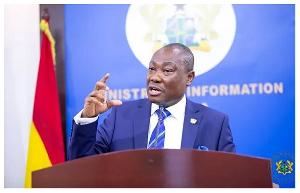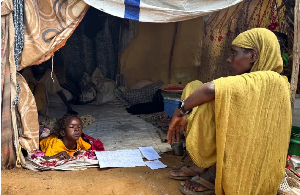Two prosecution witnesses who gave evidence in the Quality Grains case on Wednesday told the Fast Track Court in Accra that the company could not satisfy the bank's condition for a loan or a guarantee, writes the Daily Graphic.
The witnesses, Dr Percival Alfred Kuranchie and Mr John Samuel Cook, Managing Director and Project Manager, respectively, of the Agricultural Development Bank (ADB), however, said the project was technically feasible and financially viable.
Dr Kuranchie and Mr Cooke said these when they gave evidence at the court, presided over by Mr Justice Kwame Afreh, an Appeal Court Judge who sat as an additional High Court judge in the case in which six ministers and senior public officers in the NDC administration are being tried for allegedly causing $20 million financial loss to the state.
They are Mr Ibrahim Adam, former Minister of Food and Agriculture; Dr Samuel Dapaah, former Chief Director of the Ministry of Food and Agriculture; Mr Kwame Peprah, former Minister of Finance; Dr George Yankey, former Director of Legal Sector Private and Financial Institutions Division of the Ministry of Finance; Nana Ato Dazie, former Chief of Staff, and Mr Kwesi Ahwoi, former Chief Executive of the Ghana Investment Promotion Centre.
They have all pleaded not guilty to the charges of conspiracy and causing financial loss to the state and are on self-cognisance bail.
Led in evidence by Mr Osafo Sampang, Director of Public Prosecutions (DPP), Mr Cooke said in July 1995, he was invited to a meeting with the directors of Quality Grain Company Ghana Limited to discuss a project report submitted by the company for farming activities and the production and exportation of other agricultural commodities.
Mr Cooke said the meeting was attended by officials of the bank, including himself and Dr Kuranchie on one hand, while the directors of the company were represented by Ms Juliet Renee Woodard, Mr Bismark Nettey and a representative of Egala, Atiso & Co., the accounting firm for the project.
"After the discussions, my MD asked me to look at the report submitted and appraise it since it did not contain all the technicalities that are required by the bank," he said.
According to him, he interviewed the directors of the company, visited the project site and requested all supporting documents from the company, which included the company's registration certificate and the technical report submitted to it by the Ministry of Food and Agriculture. "At the end of the appraisal, I came to the conclusion that the project was technically feasible and financially viable and that the loan could be paid in less than three years," Mr Cooke said.
He said the company, however, could not satisfy the bank's condition of providing 40 per cent of the project cost and added that when "I reported this to the Managing Director of the bank, the bank decided not to finance the project because the company failed to meet the requirement for financial assistance".
Earlier Dr Kuranchie had said that after careful examination of the report that the company submitted to the bank, it was detected that it fell short of some technical requirements so he referred the report to the Head of the Corporate Department to assist the company to appraise its report. He said after the appraisal of the report, he gave a feedback to Mr Adam, the sector minister, that the project was bigger than the bank could finance.
He said the money was to be provided by the EXIM Bank, while ADB was to serve as a guarantor.
Editorial News of Thursday, 5 July 2001
Source: --






![Emmanuel Tetteh George and his wife Ruth Ewoenam [Image Credit: Manuel Photography] Emmanuel Tetteh George and his wife Ruth Ewoenam [Image Credit: Manuel Photography]](https://cdn.ghanaweb.com/imagelib/pics/943/94388192.295.jpg)





